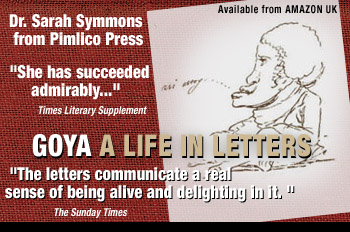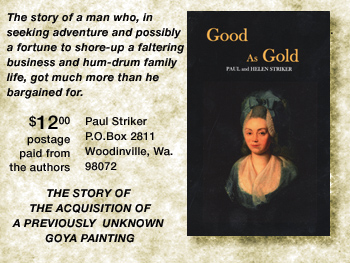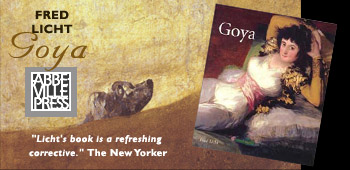| |
GOYA NEWS PAGE ARCHIVE
PAGE 5
Sarah Symmon's Art and Ideas: Goya book sales exceed 200,000
Details about this book (we have a review here) are at the sarahsymmons.com web site. It also notes the book has been translated into French, Japanese and Greek.

 Echoes of Goya Multimedia Presentation Echoes of Goya Multimedia Presentation
Classical guitarist William Feasley has been presenting a multimedia guitar and image performance titled "Echoes of Goya," in concert halls and music festivals. (A list of reviews and other information can be seen at umbc.edo here.) I wrote to the William Feasley web site to ask about this presentation, and Mr. Feasley replied:
 I have just returned from a residency at the Centrum Chamber I have just returned from a residency at the Centrum Chamber 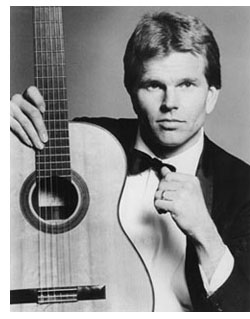 Music Festival in Port Townsend, Wa., where, among other musical activities, I presented my "Echoes of Goya" show. I have performed it worldwide, both in conjunction with a traveling show of the Caprichos and as a free standing concert event. Music Festival in Port Townsend, Wa., where, among other musical activities, I presented my "Echoes of Goya" show. I have performed it worldwide, both in conjunction with a traveling show of the Caprichos and as a free standing concert event.
The show itself takes the form of a guitar recital with an accompanying power point slide show. The works of Goya that are featured range from his early "cartoons" through his mature portraiture, examples of the black paintings, six Caprichos and on to the Milkmaid of Bordeaux. The music
falls into three categories; music that was around Goya as he created his art, music that his art inspired and my musical associations between Goya's art and Spanish music.
The repertoire for the concert continues to evolve - most recently I commissioned "Three Goya Portraits" from the Cuban-American composer Jose Lezcano (which I premiered at the Mertz Int'l Guitar Festival in Bratislava in 2003).
The next time I will present Echoes of Goya will be at the Virginia Museum of Art in Richmond, Virginia on September 17, 2006.
Sonora Productions distributes William Feasley's music on CD. The Sonora web site is here.
The William Feasley Classical Guitarist web site is here.

Steinbeck Center in Salinas California Presents Caprichos Exhibit
Near Monterey, California, Francisco Goya: Los Caprichos, on exhibit June 10 through August 6, 2006. Steinbeck Center web site here. The Monterey Herald has an article by Claudia Melindez Salinas on the exhibit here.
 This is the kind of artwork you would expect to see at Del Prado in Spain or the Los Angeles County Museum of Art, not at the National Steinbeck Center. This is the kind of artwork you would expect to see at Del Prado in Spain or the Los Angeles County Museum of Art, not at the National Steinbeck Center.
"Los Caprichos," a collection of Spanish master Francisco Goya's famed etchings, will be on display beginning today at the Salinas museum, the first time it has brought to town the works of such an influential, world-renowned artist.
"I wanted to bring this to Salinas," said Leti Bocanegra, the center's curator. "You don't see this kind of work here. It's important for the local community to be exposed to this."
Goya, considered by many the father of modern art, created his "Caprichos" -- Spanish for "whims" -- around 1797 after he went deaf from a serious illness. While convalescing in Andalucia, Goya devoted his time to portraying the reality that surrounded him. Judging by "Caprichos," society was not pretty.
The artist makes fun of human weaknesses and superstitions. In his piece "A caza de dientes" (Hunting for Teeth), he deplores the commonly held belief that the teeth of a hanged man would be a powerful ingredient for spells. In "Tal para cual" (Made for Each Other), he seems to be making fun of a pretentious couple -- neither the man nor the woman seem to be interested in each other.
"He set out to analyze the human condition and denounce social abuses and superstitions," wrote exhibit curator Robert Flynn Johnson, of the Achenbach Foundation for Graphic Arts, Fine Arts Museums of San Francisco.

 Caprichos Exhibit on Guam Caprichos Exhibit on Guam
The Guam Pacific Daily reports on a Caprichos exhibit at the Isla Center for the Arts at the University of Guamin Mangilaoe here. The exhibit includes pieces by other artists, but the main feature is a set of 80 aquatint plates from Los Caprichos. The prints will be on exhibit through July 28 at the Isla center, 15 Dean's Circle, UOG. Admission is free. The main website for the Arts Center is here.

Madrid, the Prado and Goya Travel
The New Zealand stuff.com carries a Sydney Morning Herald article on the city with the most Goya paintings in the world here. Also, for those considering travel to the Prado, the UK Times Online has a general article (mentioning Goya) about Madrid here.

New Goya painting discovered
news24.com is reporting the discovery of a Goya painting from his Italian period. Note especially the characteristic of "a hidden face" mentioned about the painting:
 Malaga-based expert, Paulino Gimenez, said "The Rope", acquired for €18 000 as an anonymous work 35 years ago, is worth about euro 4m. Malaga-based expert, Paulino Gimenez, said "The Rope", acquired for €18 000 as an anonymous work 35 years ago, is worth about euro 4m.
The painting shows a woman, dressed in Roman-style clothing and holding a child, looking down from a window.
Gimenez believes the painting was painted by Goya around 1770, when he was an art student in Italy.
The painting belongs to a British private collector who bought it in London.
The owner began suspecting the painting might have a link with Goya and called Gimenez, whose 10-month investigation led him to establish that the painting bore the hallmarks of Goya - such as a face hidden in it.
Read more here.

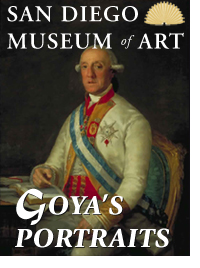 GOYA'S PORTRAITS at the San Diego Museum of Art GOYA'S PORTRAITS at the San Diego Museum of Art
An article from the Los Angeles Times reviewing the California exhibit by Christopher Knight is here.
The official page site for the exhibit is here.
 Goya is a technician of supreme skill. Even as early as the 1780s, when he was still in his 30s, he was gaining renown as an incomparable portrait painter. The canvases in the San Diego show were all made later, ranging from 1790 to 1815, and in most of them he's working in top form. Goya is a technician of supreme skill. Even as early as the 1780s, when he was still in his 30s, he was gaining renown as an incomparable portrait painter. The canvases in the San Diego show were all made later, ranging from 1790 to 1815, and in most of them he's working in top form.
Yes, he can be perfunctory, as demonstrated by the pedestrian full-length figure of a Peruvian landowner posed before his estate and flanked by an adoring dog, whose upturned snout pokes above the distant horizon to likewise direct your deferential gaze toward his master. (The composition recalls Gainsborough.) But even perfunctory Goya can be guaranteed to include remarkable passages.
Take the disconcerting orb of wispy golden light hovering at the Peruvian's side. On closer inspection it's nothing but the interior lining of the tricorn hat the gentleman holds in his hand. But slowly it dawns that this radiant orb is a secular halo, poised to anoint his head.

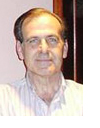 Dr. Pereles Goya authentication work officially recognized Dr. Pereles Goya authentication work officially recognized
Our friends at goyadiscovery.com have been keeping track of the rapidly changing world of Goya authentication and scholarly work. Recently it is noted that Dr. Pereles, who has championed the "micro-signatures" as a way of documenting Goya's authorship of a disputed painting, has been officially recognized by the Spanish business journal Actualidad Economica. Read more here.

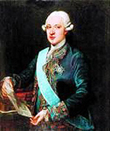 GOYA "Conde de Floridablanca" on sale in Spain GOYA "Conde de Floridablanca" on sale in Spain
goyadiscovery.com reports on a Spanish language article from the Heraldo which details both the coming sale of a Goya portrait, and of the assessment of "hidden signatures" within the image itself:
 This Goya painting is a portrait of the "Conde de Floridablanca" painted between the years 1782 and 1783, and it has "secrets;" like a human figure of small proportions that can be perceived in the portrait's left eye and a strange signature in one of the character's hands.... This Goya painting is a portrait of the "Conde de Floridablanca" painted between the years 1782 and 1783, and it has "secrets;" like a human figure of small proportions that can be perceived in the portrait's left eye and a strange signature in one of the character's hands.... 

UPDATED:
Goya Audio lectures from Dr. Sarah Symmons
Three recordings are available as mp3 files at her website here.
[1] The Woman in White: Goya's first portrait of the Dutchess of Alba, 30 minutes.
[2] Printing the Unprintable: The World of Goya' caprichos, 27 minutes.
[3] "Francisco de Goya" A public lecture given at The Wallace Collection, London on November 24th, 2005, 45 minutes.
 The studio is comparatively bare, there are no pictures upon the wall, no half-finished canvases stacked in a corner. In another letter written a few years earlier, Goya itemized the sort of space in which he liked to live and work. 'I don't need much furniture for my place, for I think that with a print of the Virgin of the Column, a table, five chairs, a frying pan, wine bag and guitar, and a ...lamp, anything else would be superfluous'. The studio is comparatively bare, there are no pictures upon the wall, no half-finished canvases stacked in a corner. In another letter written a few years earlier, Goya itemized the sort of space in which he liked to live and work. 'I don't need much furniture for my place, for I think that with a print of the Virgin of the Column, a table, five chairs, a frying pan, wine bag and guitar, and a ...lamp, anything else would be superfluous'. [From the Wallace Collection Lecture] [From the Wallace Collection Lecture]

Francisco Goya: Los Caprichos exhibit at the Robert Hull Fleming Museum in Burlington, Vermont
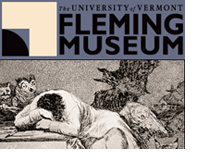 The exhibit runs through May 14. The museum programs include a lecture at 12:15 p.m. April 5 on Goya's printmaking techniques by Jane Kent; a lecture at 6 p.m. April 20, "Word and Image in Goya's Caprichos," by Reva Wolf; and museum open house weekend, complimentary admission April 21-23. The exhibit runs through May 14. The museum programs include a lecture at 12:15 p.m. April 5 on Goya's printmaking techniques by Jane Kent; a lecture at 6 p.m. April 20, "Word and Image in Goya's Caprichos," by Reva Wolf; and museum open house weekend, complimentary admission April 21-23.
The Museum is located at 61 Colchester Ave., on the campus of the University of Vermont. Admission is $5, $10 for families, $3 for students and seniors. The hours are 9 a.m. to 4 p.m. Tuesday through Friday, and 1 to 5 p.m. Saturday and Sunday. For more information call (802)656-2090.
The Times Argus has a review by Anne Galloway here.
 His portfolio of etchings, "Los Caprichos," (or the caprices) poke fun at the follies of humankind. And taking a tour of an exhibition of his more than 80 works at the Fleming Museum in Burlington is every bit as effective a form of self-abnegating absolution as eating fish on Friday. His portfolio of etchings, "Los Caprichos," (or the caprices) poke fun at the follies of humankind. And taking a tour of an exhibition of his more than 80 works at the Fleming Museum in Burlington is every bit as effective a form of self-abnegating absolution as eating fish on Friday.
The Fleming is the only place on the University of Vermont campus where you can see so much drunkenness, debauchery and gluttony in one building – outside of a frat house. And seeing so many other people making fools of themselves seems reason enough to think twice about doing anything sinful yourself.
While the figures in Goya's realistic prints are clothed in the romantic dress of the late 18th century: top hats, frock coats and frilly long dresses, the subject matter – adultery, pedophilia, prostitution, and the abuses of power, corporal and capital punishment – is surprisingly contemporary.
The official Museum web site is here.



New Interview with Dr. Sarah Symmons
See our page about Dr. Symmons here.
Dr. Sarah Symmon's web site is here.
 After the publication in
England of Edmund Burke’s “Philosophical Enquiry into the Sublime
and the Beautiful” in 1757, artists and spectators throughout Europe
became more aware of the psychological properties of images and artistic
illusion. Burke writes of ‘vastness’ and ‘obscurity’
as particular elements of the Sublime and his book became one of the greatest best sellers of the 18th century. It was particularly well known among Spanish Enlightenment figures
like Goya’s patrons Jovellanos and Cean Bermudez. I don’t know if
Goya himself ever read the book but I’m fairly certain that he would have
had a good idea of its contents. His use of aquatint in the Caprichos and lavis
and aquatint in the Disparates points to an artist obsessed with putting more
into a background than may meet the eye at first. I think he was fascinated by
the perceptive power of art, the strength of visual suggestion, the concealing
of new images in obscurity and peopling his strange nocturnal landscapes with
evocative shapes. After the publication in
England of Edmund Burke’s “Philosophical Enquiry into the Sublime
and the Beautiful” in 1757, artists and spectators throughout Europe
became more aware of the psychological properties of images and artistic
illusion. Burke writes of ‘vastness’ and ‘obscurity’
as particular elements of the Sublime and his book became one of the greatest best sellers of the 18th century. It was particularly well known among Spanish Enlightenment figures
like Goya’s patrons Jovellanos and Cean Bermudez. I don’t know if
Goya himself ever read the book but I’m fairly certain that he would have
had a good idea of its contents. His use of aquatint in the Caprichos and lavis
and aquatint in the Disparates points to an artist obsessed with putting more
into a background than may meet the eye at first. I think he was fascinated by
the perceptive power of art, the strength of visual suggestion, the concealing
of new images in obscurity and peopling his strange nocturnal landscapes with
evocative shapes.
The entire interview, March 2006, is here.

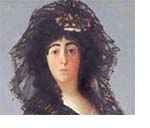 Goya's Duchess of Alba (Black Portrait) to move Goya's Duchess of Alba (Black Portrait) to move
WYNC Public Radio reports here.
 The Hispanic Society is looking to move downtown from its Washington Heights home. The group has one of the largest Hispanic art collections outside of Spain -- with paintings by Goya and El Greco -- but very few people come up to 155th Street see it. The Hispanic Society is looking to move downtown from its Washington Heights home. The group has one of the largest Hispanic art collections outside of Spain -- with paintings by Goya and El Greco -- but very few people come up to 155th Street see it.
Our page on the Hispanic Society's Goya painting is here.
 New Review of Frick Collection Exhibit Goya's Last Paintings
New York Post article by James Gardner here.
 “Physically weak and mentally unsteady at times, Goya (1746-1828) clearly has lost, in many of these works, some of the control that he exhibited earlier in his career. This is especially true of a painting like "The Milkmaid of Bordeaux" which, despite its popularity, is feeble in execution, composition and even sentiment. “Physically weak and mentally unsteady at times, Goya (1746-1828) clearly has lost, in many of these works, some of the control that he exhibited earlier in his career. This is especially true of a painting like "The Milkmaid of Bordeaux" which, despite its popularity, is feeble in execution, composition and even sentiment.
At other times, however, he could channel that same dislocation into a moving and eccentric masterpiece, like his noble "Self-Portrait With Dr. Arrieta." Here, in a harrowing depiction of his own suffering, he pays tribute to the man who saved the ill painter's life.
In still other works, however, like his portraits of the playwright Moratin, the architect Perez and the lawyer Silvela, he is in complete mastery of his art.

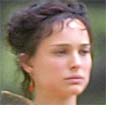 Update to the film "Goya's Ghosts" Update to the film "Goya's Ghosts"
The 'Official' page on the movie from Hanway Films is here.
Our page of general information on the film is here.
 The revolution has sent neighboring France in turmoil and the Spanish church decides to restore order by brining back the dreaded Inquisition. Spearheading this movement is the enigmatic and cunning priest Lorenzo, a man who seeks power above all. The revolution has sent neighboring France in turmoil and the Spanish church decides to restore order by brining back the dreaded Inquisition. Spearheading this movement is the enigmatic and cunning priest Lorenzo, a man who seeks power above all.
Lorenzo's friend is Francisco Goya, Spain's most famous artist and portraitist to kings and queens. When his beautiful model is unjustly imprisoned and tortured by the Inquisition their friendship is put to the test as Goya begs Lorenzo to spare the poor girl's life.
Egotastic.com has pictures from the movie set
here.
The IMDB Motion Picture web site has information here
Wikipedia has information online here.
Article about the Goya's Ghosts film star Natalie Portman here.

Fiction book "Pictures by Goya & Other Stories" Released
Review at the Sydney Morning Herald by Michael McGirr here.
 Unhurried, ruminative stories from one of New Zealand's best writer. Unhurried, ruminative stories from one of New Zealand's best writer.
The Times-Online has a review here.

Review of Frick Collection Exhibit Goya's Last Paintings
New York Magazine article by Mark Stevens here.
 “I have no eyesight, pulse, pen or ink,” wrote the elderly Francisco de Goya y Lucientes, half-jokingly, in a letter to a friend. “The only thing I have in excess is willpower.” No doubt the painter meant that, despite the infirmities of age, he was still producing pictures. But anyone who sees “Goya’s Last Works” at the Frick Collection will sense something nobler than endurance in those wry lines. Goya, as he neared death, made no compromises: There was no wavering of the eye, no softening of the sensibility. He remained as committed as ever — relentlessly so, joyfully so — to the revelatory truth. “I have no eyesight, pulse, pen or ink,” wrote the elderly Francisco de Goya y Lucientes, half-jokingly, in a letter to a friend. “The only thing I have in excess is willpower.” No doubt the painter meant that, despite the infirmities of age, he was still producing pictures. But anyone who sees “Goya’s Last Works” at the Frick Collection will sense something nobler than endurance in those wry lines. Goya, as he neared death, made no compromises: There was no wavering of the eye, no softening of the sensibility. He remained as committed as ever — relentlessly so, joyfully so — to the revelatory truth.
New Jersey Star-Ledger article by Dan Bischoff here.
 “For years, art historians have ascribed the terrifying distortions of Goya's so-called "Black Paintings"-- the brutally horrific images, such as "Saturn Devouring One of His Children," which he painted on the wall of his house directly opposite the chair where he took his breakfast -- to his experience with the unknown illness. The master's two greatest print series, "Los Caprichos" (full of witches, owls with human faces and levitating monks) and "The Disasters of War" (images that seem to have invented war reporting, even predicting the Abu Ghraib pictures), were both conceived by a deaf man, and, one might think, therefore a lonely and possibly an angry one. “For years, art historians have ascribed the terrifying distortions of Goya's so-called "Black Paintings"-- the brutally horrific images, such as "Saturn Devouring One of His Children," which he painted on the wall of his house directly opposite the chair where he took his breakfast -- to his experience with the unknown illness. The master's two greatest print series, "Los Caprichos" (full of witches, owls with human faces and levitating monks) and "The Disasters of War" (images that seem to have invented war reporting, even predicting the Abu Ghraib pictures), were both conceived by a deaf man, and, one might think, therefore a lonely and possibly an angry one.
It's a good story, and there may even be a grain of truth in it. But Goya is so much more than that simple story can explain, and as if to prove that, the Frick Collection has just opened "Goya's Last Works," a show of nine oil portraits, 31 graphic works on paper, and 10 miniatures on ivory, all of them produced in the last eight or so years of the artist's life..

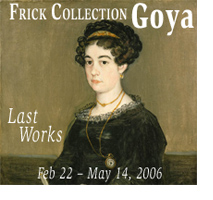 Frick Collection presents Exhibit Goya's Last Paintings: Frick Collection presents Exhibit Goya's Last Paintings:
February 22 through May 14, 2006. The Frick web site is
here.
 Goya’s Last Works will be the first exhibition in the United States to concentrate exclusively on the final phase of this artist’s career. It is the third in a series of critically acclaimed presentations focused on Spanish art at The Frick Collection, following Velázquez in New York Museums (1999) and El Greco: Themes and Variations (2001). Organized by Jonathan Brown, Carroll and Milton Petrie Professor of Fine Arts, New York University, and Susan Grace Galassi, Curator at The Frick Collection, the exhibition will be accompanied by a fully illustrated scholarly catalogue published by Yale University Press as well as a series of lectures. Goya’s Last Works will be the first exhibition in the United States to concentrate exclusively on the final phase of this artist’s career. It is the third in a series of critically acclaimed presentations focused on Spanish art at The Frick Collection, following Velázquez in New York Museums (1999) and El Greco: Themes and Variations (2001). Organized by Jonathan Brown, Carroll and Milton Petrie Professor of Fine Arts, New York University, and Susan Grace Galassi, Curator at The Frick Collection, the exhibition will be accompanied by a fully illustrated scholarly catalogue published by Yale University Press as well as a series of lectures.
The exhibition features approximately fifty works by Goya, including oil portraits of friends and family who accompanied and aided him in his final years, drawings from his last two albums made primarily for himself, lithographs — a new medium that he quickly mastered — and experimental tiny paintings on ivory. Lenders to the exhibition include private and public collections in Spain and the United States.

Flemish Museum has exhibit of Los Caprichos
The University of Vermont Flemish Museum has a full-scale exhibit of the Goya Los Caprichos etchings. The museum web site is here and a report on the show by the Burlington Free Press is here. Excerpt below:
 The Fleming Museum at the University of Vermont opened two exhibitions Thursday evening: "The Inferno of Dante" by contemporary artist Michael Mazur and "Los Caprichos" by famed Spanish painter Francisco Goya. Bring a strong stomach, steeled nerves and an open mind. "Both of these shows," UVM President Daniel Fogel said in introducing the exhibitions, "show the vision of artists who look into the heart of darkness. The Fleming Museum at the University of Vermont opened two exhibitions Thursday evening: "The Inferno of Dante" by contemporary artist Michael Mazur and "Los Caprichos" by famed Spanish painter Francisco Goya. Bring a strong stomach, steeled nerves and an open mind. "Both of these shows," UVM President Daniel Fogel said in introducing the exhibitions, "show the vision of artists who look into the heart of darkness.

New York Times on Goya's Ivory Paintings
Annette Grant at the New York Times has an article on the Ivory paintings Here. Excerpt below:
 ...at 78, the Spanish painter Francisco de Goya (1746-1828) began making freestyle tableaus on small ivory flats usually used for miniatures. He did this by blackening the ivory, dropping water on the surface and shaping the resulting smears into faces and torsos. What emerged were Goyas as distinct in style and content as any of his paintings or prints, except that these appear to be illuminated from the inside. Instead of applying paint to a surface, Goya seemingly conjured these images from within, much as Michelangelo "released" the figure from a slab of marble.. ...at 78, the Spanish painter Francisco de Goya (1746-1828) began making freestyle tableaus on small ivory flats usually used for miniatures. He did this by blackening the ivory, dropping water on the surface and shaping the resulting smears into faces and torsos. What emerged were Goyas as distinct in style and content as any of his paintings or prints, except that these appear to be illuminated from the inside. Instead of applying paint to a surface, Goya seemingly conjured these images from within, much as Michelangelo "released" the figure from a slab of marble..

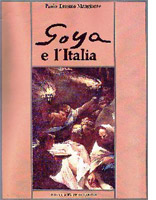 New Goya Book from Professor Paolo Erasmo Mangiante New Goya Book from Professor Paolo Erasmo Mangiante
"Goya Micro-Signatures" examined further.
goyadiscovery.com has an interview with French former General Secretary of the "International Organization of Art Experts," Didier Pouech, discussing Professor Mangiante's work here):
 What do you think of your colleague's findings? (Refering to the discovery of the micro-signatures in Goya's paintings.) What do you think of your colleague's findings? (Refering to the discovery of the micro-signatures in Goya's paintings.)

 Answer: Didier Pouech "My first reaction, like that one of any other expert, has been to doubt.... but with all the evidences that he contributed I immediately realized that he was right. On the other hand, after further reviewing the artist's biography and his mentality, it is confirmable that we are dealing with a fact that perfectly fits in such a context. My position therefore is a categorical one, I adhere to the conclusions of Dr. Rolph Medgessy. Answer: Didier Pouech "My first reaction, like that one of any other expert, has been to doubt.... but with all the evidences that he contributed I immediately realized that he was right. On the other hand, after further reviewing the artist's biography and his mentality, it is confirmable that we are dealing with a fact that perfectly fits in such a context. My position therefore is a categorical one, I adhere to the conclusions of Dr. Rolph Medgessy.

More about Goya "micro-signatures" here.

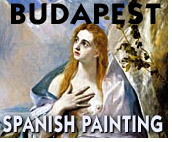 Five Centuries of Spanish Painting at the Budapest Fine Arts Museum Five Centuries of Spanish Painting at the Budapest Fine Arts Museum
The Budapest Times reports on the exhibit here
Budapest Fine Arts Museum website here
 Matthias Wagner, art historian at the Bavarian National Museum, came up with the original idea for the exhibition, when he decided to present the most important Spanish works in Germany in one exhibition. It resulted in the popular exhibition “Spanish Masters in German Collections”, which ran last year at the Bucerius Kunst Forum in Hamburg and the Gemäldegalerie Alte Meister in Dresden. Matthias Wagner, art historian at the Bavarian National Museum, came up with the original idea for the exhibition, when he decided to present the most important Spanish works in Germany in one exhibition. It resulted in the popular exhibition “Spanish Masters in German Collections”, which ran last year at the Bucerius Kunst Forum in Hamburg and the Gemäldegalerie Alte Meister in Dresden.
A selection of the German collection, some 39 pictures, was shipped to Budapest and now forms, alongside loans from the Kunsthistorisches Museum in Vienna and the Prado in Madrid, half of the Budapest exhibition. The exhibition is costing HUF 130 million (EUR 519,430), with the insurance costs alone amounting to HUF 50 million (EUR 199,793). The works by El Greco, Velázquez, Ribera, Goya, Murillo and others will be on show in the Baroque Hall of the Museum of Fine Arts until April 30.

|
|
|


 Music Festival in Port Townsend, Wa., where, among other musical activities, I presented my "Echoes of Goya" show. I have performed it worldwide, both in conjunction with a traveling show of the Caprichos and as a free standing concert event.
Music Festival in Port Townsend, Wa., where, among other musical activities, I presented my "Echoes of Goya" show. I have performed it worldwide, both in conjunction with a traveling show of the Caprichos and as a free standing concert event.  Caprichos Exhibit on Guam
Caprichos Exhibit on Guam GOYA'S PORTRAITS at the San Diego Museum of Art
GOYA'S PORTRAITS at the San Diego Museum of Art Dr. Pereles Goya authentication work officially recognized
Dr. Pereles Goya authentication work officially recognized GOYA "Conde de Floridablanca" on sale in Spain
GOYA "Conde de Floridablanca" on sale in Spain  The exhibit runs through May 14. The museum programs include a lecture at 12:15 p.m. April 5 on Goya's printmaking techniques by Jane Kent; a lecture at 6 p.m. April 20, "Word and Image in Goya's Caprichos," by Reva Wolf; and museum open house weekend, complimentary admission April 21-23.
The exhibit runs through May 14. The museum programs include a lecture at 12:15 p.m. April 5 on Goya's printmaking techniques by Jane Kent; a lecture at 6 p.m. April 20, "Word and Image in Goya's Caprichos," by Reva Wolf; and museum open house weekend, complimentary admission April 21-23. 
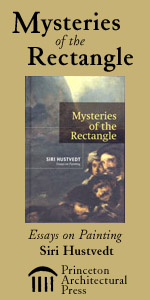
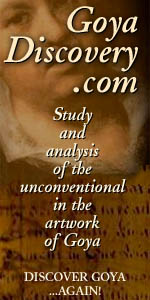
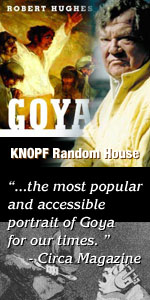



 New Goya Book from Professor Paolo Erasmo Mangiante
New Goya Book from Professor Paolo Erasmo Mangiante 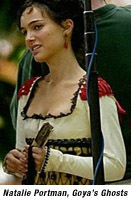 Bio film "Goya's Ghosts" to release late 2006
Bio film "Goya's Ghosts" to release late 2006  Five Centuries of Spanish Painting at the Budapest Fine Arts Museum
Five Centuries of Spanish Painting at the Budapest Fine Arts Museum 